
Folate Receptor Autoantibodies and Their Implications in Subfertility and Miscarriages
Folate receptor autoantibodies (FRAAs) are antibodies that target folate receptor alpha (FRα), a key protein involved in cellular folate uptake. Emerging research suggests that FRAAs may impair folate transport, leading to functional folate deficiency even in the presence of normal serum folate levels. This deficiency can disrupt critical processes in early pregnancy, increasing the risk of subfertility and miscarriage. This blog explores the mechanisms by which FRAAs contribute to subfertility and possible pregnancy loss, diagnostic approaches, and potential therapeutic interventions.
1. Folate and Folate Receptor Autoantibodies
Folate (vitamin B9) is essential for DNA synthesis, methylation, and fetal development. During pregnancy, folate demands increase significantly to support rapid cell division and neural tube formation. Folate receptor alpha (FRα) is highly expressed in the placenta and is crucial for maternal-fetal folate transfer.
Folate receptor autoantibodies (FRAAs) block or impair FRα function, leading to intracellular folate deficiency. This condition has been linked to pregnancy complications, including recurrent miscarriages, neural tube defects (NTDs), and other developmental abnormalities.
Mechanism of Folate Receptor Autoantibodies in Miscarriage
Folate Receptor Alpha (FRα) is predominantly expressed in placental syncytiotrophoblasts, facilitating folate uptake from maternal circulation. Folate is critical for embryogenesis, particularly in the first trimester, supporting neural tube closure and preventing chromosomal abnormalities. With the presence of folate receptor autoantibodies, it is thought that these autoantibodies cause an Autoantibody-Mediated Folate Deficiency. Blocking autoantibodies can directly inhibit folate binding to FRα, reducing cellular uptake, while binding autoantibodies form immune complexes with FRα, leading to receptor degradation. Ultimately, the presence of folate receptor autoantibodies impairs DNA synthesis possibly leading to defective embryogenesis. Additionally, this may lead to elevated homocysteine, resulting in endothelial dysfunction and placental insufficiency. Folate receptor autoantibodies may also lead to epigenetic dysregulation because of faulty folate transport leading to altered gene expression in early development.
3. Association with Recurrent Pregnancy Loss
Several studies report higher FRAA prevalence in women with unexplained recurrent miscarriages compared to controls. FRAAs may contribute to early pregnancy loss by disrupting trophoblast function and placental development.
Folate receptor autoantibodies represent a significant but underdiagnosed risk factor for miscarriage. By impairing folate transport, FRAAs induce functional folate deficiency, disrupting early pregnancy development. With this in mind, it may be prudent to screen for these folate receptor autoantibodies. The FRAT® test screens for these specific autoantibodies.
4. Who Should Be Tested?
Women with unexplained recurrent miscarriages, or previous pregnancies with neural tube defects should be tested for folate receptor autoantibodies. Additionally, women who may have had a child with autism previously may also want to be tested.
5. Therapeutic Interventions
In some cases where folate receptor autoantibodies have been found, alternate reduced folate supplementation has been prescribed. For example, folinic acid has been one of compounds used; folinic acid (5-formyl-THF) bypasses FRα, entering cells via the reduced folate carrier (RFC). In other cases, methylfolate (5-MTHF), another form of a reduced folate, which does not require FRα for cellular uptake, has been used. As with any diagnostic or therapeutic, please consult your physician for further information and guidance.
References
- Ramaekers VT, et al. (2016). “Folate receptor autoantibodies and spinal fluid folate in infantile autism.” EBioMedicine.
- Rothenberg SP, et al. (2004). “Autoantibodies against folate receptors in women with a pregnancy complicated by a neural-tube defect.” N Engl J Med.
- Quadros EV, et al. (2018). “Folates and autoantibodies against folate receptors in neurodevelopmental disorders.” Frontiers Neuroscience.
- Xue-Yun Qin, Si-Yao Ha, Lu Chen, Tao Zhang, Ming-Qing Li
“Recent Advances in Folates and Autoantibodies against Folate Receptors in Early Pregnancy and Miscarriage”. Nutrients



